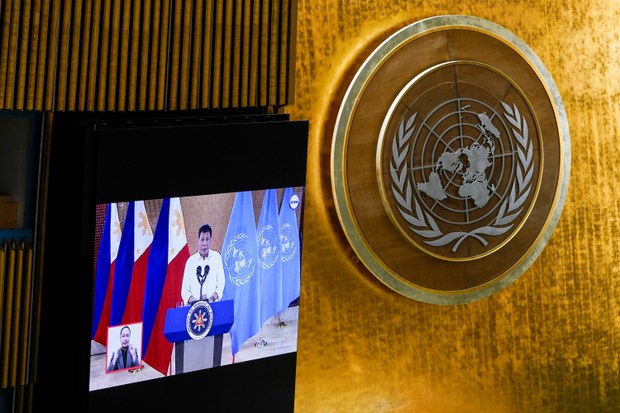Facing ICC Probe, Duterte Defends Philippine Drug War Before UN General Assembly
2021.09.22
Manila
 Philippines President Rodrigo Duterte speaks remotely during the 76th Session of the General Assembly at U.N. Headquarters in New York, Sept. 21, 2021.
Philippines President Rodrigo Duterte speaks remotely during the 76th Session of the General Assembly at U.N. Headquarters in New York, Sept. 21, 2021.
Philippine President Rodrigo Duterte defended his controversial war on drugs before the United Nations General Assembly, a week after The Hague-based International Criminal Court approved an investigation into the deadly campaign.
The Southeast Asian leader also appeared to take aim at China, without naming the superpower, when he said that no nation, however influential, could disregard Manila’s 2016 victory against Beijing in an international arbitration case over the disputed South China Sea.
In what appeared to be a concession to the demands of the International Criminal Court (ICC), Duterte said in a pre-recorded video speech that he had ordered a government probe into questionable deaths in his anti-drugs campaign, but also said his administration had the right to enforce the rule of law.
“We will deal with all criminals, including terrorists, with the full force of our laws,” Duterte said in the last speech of his presidency at the U.N. General Assembly early on Wednesday (Manila time).
“I have instructed the Department of Justice and the Philippine National Police to review the conduct of our campaign against illegal drugs. Those found to have acted beyond bounds during operations shall be made accountable before our laws.”
Duterte’s lawyer had said last week the president would not cooperate with the ICC on the investigation, as a “foreign institution” had no jurisdiction to carry out such a probe.
The Philippines has not been a member of the ICC since 2019 when Duterte pulled the country out of the treaty, but the ICC inquiry includes the period when it was a member.
Rights groups as well as the U.N. have criticized Duterte’s war on drugs for its use of lethal force in official law enforcement operations, and alleged extrajudicial killings, often carried out by masked assassins.
The majority of the victims of his drug war have been poor people living in slums or low-income neighborhoods. Some of them were minors, including young children hit by stray bullets.
The ICC judges had said that the Philippine authorities “failed to take meaningful steps to investigate or prosecute the killings,” noting that only one case resulted in convictions.
On Wednesday, a human rights researcher said that of thousands of questionable killings, only one case had been properly investigated, which led to the jailing of three policemen.
“A vast majority of these cases are uninvestigated, with the police unwilling and unable to pursue their investigations, while families of the victims are either afraid or too poor to file cases,” Carlos Conde, the Philippines’ researcher for the New York-based Human Rights Watch, said in a statement.
‘Arbitral award’s importance’
While Duterte in his speech took aim at the U.N. – saying it was outdated and needed reform – he also said he believed that the 1982 United Nations Convention on the Law of the Sea (UNCLOS) showed the way to a solution on the issue of the disputed South China Sea.
In 2016, the International Court of Arbitration in The Hague rejected China’s sweeping claims over the South China Sea region as invalid under UNCLOS, as it ruled in favor of the Philippines in a case brought by Manila against Beijing.
UNCLOS and the arbitral award “provide a clear path towards a just, fair, and win-win solution for all,” Duterte told General Assembly.
“The Award must be seen for what it is – a benefit across the board to all who subscribe to the majesty of the law,” he said.
“No amount of willful disregard by any country, however big and powerful, can diminish the Arbitral Award’s importance.”
Manila and Beijing have had several verbal spats – including this year – over China’s alleged transgressions in Philippine waters in the South China Sea.
In March, security officials in Manila reported that about 220 ships, including some they alleged were manned by Chinese maritime militia, had anchored in the exclusive economic zone of the Philippines.
Since taking office five years ago, and with less than a year left before his single term expires, Duterte has been criticized at home for not doing enough to assert the 2016 ruling.
In his first speech at the General Assembly last September, he stridently defended ruling by the court in The Hague, but in later months said that the Philippines could not do anything if China chose to ignore arbitral award.
But earlier this week, the Philippines’ top diplomat said that Manila backed a new U.S.-U.K.-Australia defense pact because it addressed a military “imbalance” in Southeast Asia.
Philippine Foreign Secretary Teodoro Locsin Jr. did not name any countries responsible for this so-called imbalance, but he was likely referring to China.
“There is an imbalance in the forces available to the ASEAN member states, with the main balancer more than half a world away,” Locsin said of the Association of Southeast Asian Nations.
Duterte told the General Assembly that the Philippines was “one with ASEAN and other stakeholders in ensuring that the South China Sea remains a sea of peace, security and prosperity.”







